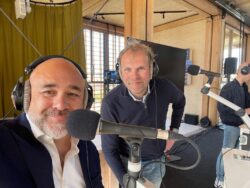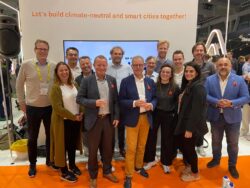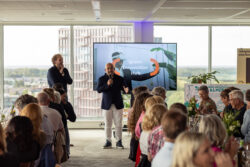
With a unique Minecraft challenge for the future city district of Pampus, Almere knows eyes are on it as an economic hub for sustainable urban development. It is one of the sprouts of the Green Innovation Hub, a non-profit initiative established in 2023. What does this public-private partnership mean for Almere, Flevoland and the Netherlands? How does it bring acceleration to sustainable urban development? We talked about that with the founders of the Green Innovation Hub, Danny Frietman (left on photo) and René Visser (right on photo). “We have only just started, but an incredible amount has already been accomplished.”
How did the current Green Innovation Hub come about?
Frietman: “In 2022, the Floriade Expo took place in Almere, with the theme ‘Growing Green Cities.’ On behalf of the Municipality of Almere and VodafoneZiggo, René and I, together with Brian Benjamin (Digital City Almere) had a conversation with the Floriade organization before that time. In it, we asked the question, “If the Floriade is about a sustainable society, what can the concept of digitization add to this? What does technology mean for the development of healthy cities between now and, say, 2030?’ That brainstorming led us to the idea of showing the significance of technology for the city of the future at the Floriade Expo. That was the birth of the Green Innovation Hub. On April 7, 2022, the Municipality of Almere, VodafoneZiggo and Floriade signed a cooperation agreement for the Green Innovation Hub at Floriade Expo 2022. It became an innovation incubator where entrepreneurs, knowledge institutions, policy makers and students could already collaborate on the sustainable city of the future. Almere residents could also give their input.”
Visser: “At a physical spot at the Floriade, the Natural Pavillon, we used Virtual Reality and Augmented Reality to show examples of a sustainable world coming within reach through the application of new technology. All the cooperation and exchange created a positive dynamic. This did not go unnoticed at the city hall: in the summer of 2022, the Green Innovation Hub was included in the college agreement for the period 2023 – 2026 of the Municipality of Almere, with associated funding of 1.6 million euros. Subsequently, VodafoneZiggo and the Province of Flevoland also committed to the Green Innovation Hub as launching partners, including a piece of additional funding. Thanks to this commitment, the Green Innovation Hub was able to continue and scale up independently after the Floriade Expo. This makes this a unique national cooperation in which the government and the business community join hands for a longer period of time.”
On Feb. 22, 2023, the Green Innovation Hub officially opened. How would you pitch this hub in one minute?
Visser: “As a breeding ground for meeting, collaboration and innovation, with a view to sustainable and inclusive urban development in Almere, the province of Flevoland and the Netherlands. Here, parties accelerate the development of digital solutions around five key themes: local food security, mobility, circular building, efficient energy distribution and social connectedness among city residents. The activities of the Green Innovation Hub will make Almere a national and international example in sustainable and inclusive urban development by 2030.” Visser jokingly adds, “This vision hangs like a tile above our bed.”
A new location was chosen in Almere’s city center. Why is Almere a logical place for this hub even after the Floriade Expo?
Visser: “Urbanization is a global trend. The big task is to keep cities livable, both ecologically and in terms of social cohesion. Almere is the fastest growing city in the Netherlands, with a population growing from the current 218,000 to 325,000 by 2050. In the new Pampus district alone, 60,000 people will live and 20,000 jobs will be created within 15 years. The new solutions for the sustainable city of the future that parties in Almere are creating in co-creation can therefore be tested, validated and scaled up locally in a unique Green Fields location: new land – government land – that is being issued for the construction of new city districts. Many of these proven new solutions can then also be used to make existing districts of Almere more sustainable, or for new or existing residential areas elsewhere in Flevoland and the Netherlands.”
Frietman: “The Green Innovation Hub is located in the Floor building in the heart of Almere. We will soon be moving from the first floor to a large 1,000-square-meter space on the 9th floor. It is a place where we will work together with other organizations on our vision. Think of it as a big dance floor where all the facilities and people are present to develop digital innovations and put them into practice. In hybrid learning environments, educational talents here can also work on business cases or business models of startups, scale-ups and existing, innovative SMEs focused on sustainable and inclusive urban development. It means that as a Green Innovation Hub, we can make a lot of progress in Almere in particular.”
How do you govern something as abstract as innovation from this hub?
Frietman: “René and I work several days a week for the Green Innovation Hub. Together we set the course and direct the projects that will emerge mainly from 2024. As a new innovation network, it is tempting to invite all kinds of parties, initiate projects and start working on them right away. After all, you want to bring something about and show that to the outside world. Yet you will get further if you first have the basics in order. We spent 70% of our time on that basis in 2023 for the hub. We had to, because with the aforementioned funding, the Green Innovation Hub entered the phase of scaling up. With that comes a strategy from which to proceed. KPMG helped us develop that strategy. With this, we laid a solid foundation.”
Visser: “The strategic basis is the OSI model: Meet, Collaborate, Innovate. Around each of these three functions we have developed program lines. These are, respectively, the community and partner program and access to open-innovation locations in Almere. From these programs we can scale up telling, relevant innovations. In all of this, marketing communication plays an important role. Think of workshops, events, innovation challenges and networking drinks. At the same time, we work with companies and students on business models, business cases, research or engineering of innovative products and services. We are genuinely proud to help innovative companies get their innovations ready for the market in this way and at the same time help students discover their possible job of the future.”

Despite this focus on strategy, what has been accomplished in tangible terms after ten months?
Frietman: “In July, together with our partners BTG, Floor, Future City Foundation, Windesheim, Horizon, UPAlmere!, Municipality of Almere and VodafoneZiggo, we organized the Green Innovation Hub Contest 2023. Ten finalists demonstrated their innovative solutions for the future Pampus Almere district. The Amersfoort-based company Civity won this competition with its ‘SmartCity Data Platform’ for energy transition. With that platform, the current supply of and demand for sustainably generated energy in a city district can be better matched. This leads to a greener, more efficient energy supply. Civity receives our support to further develop this concept for the energy transition, but also for other applications. In addition, office space has been made available for Civity in the Green Innovation Hub, and tickets to the Smart City Expo 2023 in Barcelona. But also with other finalists, we continue to build the future of the Netherlands by making our facilities and people available.”
Visser: “Furthermore, we have signed a regional partnership with the Future City Foundation, a distinguished partner of the Dutch Metropolitan Innovations ecosystem (DMI). They work with the G40 municipalities together with other governments, the ministries of Infrastructure and Water Management and the Interior and Kingdom Relations, and with the business community. The DMI ecosystem provides the Green Innovation Hub with new tools from the digital world. In doing so, innovations that improve and make urban functioning more sustainable emerge from the hub. Thanks to this regional partnership, those innovations developed in the Green Innovation Hub from Almere can then be scaled up nationwide.”
Recently, the Green Innovation Hub also launched a Minecraft Challenge for Almere Pampus. What does that entail?
Frietman: “This is what we are most proud of. Microsoft has developed a realistic, virtual Minecraft world for the newly built Almere Pampus district. That’s a gift! Justin Edwards, director of Learning Experiences at Minecraft Education, came to Almere to launch this project. Young people can help build in Minecraft that sustainable city district of the future where they might later live and work. Previously, Microsoft launched such a local Minecraft world in London and Singapore, with which the public could get to work. There, winners were chosen and eventually the move was made to physically build the respective neighborhoods. That is exactly what we are going to do here as well. Paola Huijding, the project director of Almere Pampus, clearly indicated this in a video: we need you, future residents, SMEs, architects, etc. to translate precisely this building transition, this energy challenge, this mobility issue and this desired social cohesion into the residential neighborhood of the future. Bring in your ideas and build with us.”
Visser: “We also made an English-language video about this Minecraft Challenge for Almere Pampus, ahead of the Smart City Expo in Barcelona. This is also shared worldwide by Microsoft. A great example of a sustainable application that a young person has already devised and built in Minecraft for Pampus is water storage on the roof of a building. This water reservoir, via sensors connected to it and a smart data platform with an accompanying app, can contribute to insight into – and control over – your home’s climate control. You also have control over soil management this way. This prevents any soil subsidence and provides fertile soil. Once again, the Green Innovation Hub brings together the parties who are making this innovation a reality.”

The Green Innovation Hub is an example of public-private partnerships. How do you personally collaborate in this?
Frietman: “I have been working as quartermaster of the ICT and Tech Cluster of the Almere region since 2019. In this role, I was already used to looking at technology from an ecosystem perspective as a means of innovation and social progress. Now I am also project director of the Green Innovation Hub. In building and expanding public-private partnerships in the field of technology lies my strength. In the past ten years I have organized large innovation missions for the business community around international technology fairs, commissioned by the central government. I took the knowledge, expertise and network I built up through this to Almere. René and I work together quite intensively in building and expanding the Green Innovation Hub. We meet weekly. René is very strategic. He is good at zooming out from the details of individual projects to hold or adjust the big picture of where we want to go with the Green Innovation Hub.”
Visser: “Danny has a lot of execution power, a getting-the-job-done mentality. That combination works nicely; we complement each other well. My passion lies in sustainably connecting people and organizations in order to make an impact on a changing world together. We do this by using technology as a tool, and never as an end in itself. I believe in the value of open innovation ecosystems. For example, from VodafoneZiggo I was also involved in the establishment of the 5G Hub in Eindhoven and – very recently – the Media Innovation Hub in Hilversum. The Green Innovation Hub has excellent timing, given all that is going on around sustainability in our country. New solutions are needed to solve all kinds of bottlenecks. The government needs business, knowledge institutions and the world of education to do this. Consider, for example, the jammed energy grid, which in many places puts a brake on the development of new business parks and thus on employment.”
How complex is public-private cooperation, given the sometimes clashing interests of governments and industry?
Visser: “We both understand how PPPs work. The biggest bottleneck is often the step from thinking to doing, but we really take that step. And both of us can make the translation within the Green Innovation Hub to our own organization on the one hand and the entrepreneurs, researchers, students and other stakeholders with whom we work on the other. Both Almere and VodafoneZiggo are very ambitious and happy with this partnership. We do not think from different interests, but shared interests. From our shared vision, all parties, including VodafoneZiggo, can express their own interests. For example, thanks to all the talented pupils and students at the Minecraft Challenge for Almere Pampus, we get more insight into possible new services, including smarthome services.”
Frietman: “The strength of the Green Innovation Hub is precisely that public-private partnership. Of course, in my work for this hub I am paid by the Municipality of Almere. As such, I am judged on local success. But everyone understands that we can very easily scale the new insights and solutions that arise here and that are initially applied to the development of Almere Pampus to other locations in Flevoland, the Netherlands and even abroad. That is exactly the sequence. With a partner like VodafoneZiggo and René, we can scale up this hub. The tipping point is precisely in the fact that we are making this innovation work not only for Almere, but also for other cities. Also, the launch of that Minecraft Challenge for Pampus means that we can engage a lot of other cities, schools and SMEs. That doesn’t have to come at the expense of Almere as a partner in the Hub. On the contrary: when that scaling up of the business model leads to additional revenue for the Hub, you can invest money back into Almere from that.”
Introducing: Danny Frietman
Danny Frietman (52) advises the Municipality of Almere on ICT and Tech and is project director of the Green Innovation Hub. Danny is from The Hague, lives in Voorburg, is married and father of three children aged 19, 17 and 13. His hobbies are tennis, paddling, traveling and fine dining, for example on his own boat.
In 2018, Danny was elected “Hagenaar of the Year” for building the Hague tech cluster: among other things, he brought two large annual conferences on privacy and internet security to The Hague from abroad. He also positioned the Municipality of The Hague on major international stages. This formed the starting point for a new local industry around the themes of “Tech for Good” and “Privacy & Security. These themes fit perfectly with The Hague’s international profile as a beacon of peace, security and justice.
Danny studied Business Administration in Rotterdam. He began his career in the 1990s at IBM. Even before the turn of the century, he developed apps for cell phones from his own startup. In doing so, he proved to be a little too ahead of his time; the iPhone did not yet exist. For the past fifteen years, Danny has been a day chairman and moderator at national and international tech events, including the immense annual tech, arts, media and Internet festival SXSW in Austin, USA; he also organized Dutch missions to the world’s largest telecom congress – the Mobile World Congress – and the Smart City Expo. He is also founder of GovTech NL, a government acceleration tool for upscaling innovative companies.
Introducing: René Visser
René Visser (46) is senior external affairs manager at VodafoneZiggo. A passionate networker, he is a founder of the 5G Hub Eindhoven, the Green Innovation Hub Almere and the Media Innovation Hub Hilversum. These three innovation hubs are located at economic hubs in the Netherlands. Collaboration in new networks with the use of new technology as an enabler: that is what René considers indispensable to create solutions for complex social issues such as sustainable urban development, partly given the major housing challenge in the Netherlands. But also, for example, for the transition to the immersive world: a world in which all the senses are engaged thanks to technology.
René lives in Haarlem, is cohabiting and father of two children aged 11 and 8. His hobbies are water polo, working with drones, making videos and hiking. He likes the switch between the dynamics of the city and the tranquility of nature. From his cottage in the Veluwe he likes to take early or late walks, where even the wolf was not left unspotted. René studied in Groningen and worked successively for Verizon, UPC, Ziggo and legal successor VodafoneZiggo.
Author: Wim Danhof, November 3th 2023
